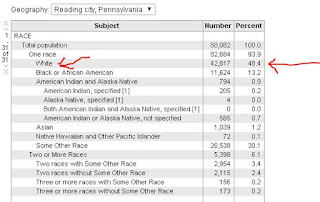by Steve Reinbrecht
Many Latinos in
Reading are upset because City Council snubbed the Latino community by voting
5-1 on Monday to place an old white man in a vacant council seat rather than a
prominent Latina, Johanny Cepeda.
For one, it invoked
an important message in Obama’s speech Tuesday.
In his Reading Eagle
column Tuesday, City Hall reporter Don Spatz scolded Cepeda’s supporters for
not following the process.
“Sorry,
folks, but you have to know the rules before you grouse.”
Neither Spatz’s
article about the vote Monday nor his column mentioned that Cepeda is the executive director of the Berks County Latino Chamber.
She’s also a
successful downtown-business owner, having run Mi Casa Su Casa restaurant on
Penn Street for years.
And she’s gotten her
feet wet politically. Last spring, she lost a primary challenge against Councilman
[now President] Jeff Waltman by 78 votes. She had a record 117 write-in
votes in November.
So why give the spot
on council to John Slifko? I’m sure he is a
wise, fair and ethical man who knows a lot about the city and its governance. But
isn’t it time to have leaders more representative of the city?
On such an obviously
important issue, the Eagle had a duty to poll each member on his or her vote:
How can you justify giving this seat to an old white man instead of a Latina
woman?
In general, Council
cited their secret interview scores. Slifko topped Cepeda. Just math.
Latinos won’t vote
and get engaged in local politics until they think they have a chance.
That hurts
everybody.
It opens the way for
demagoguery as we see in the rhetoric of the new mayor, Wally Scott.
He says he wants a
Latino, “Rei” Encarnacion, as his managing director. But observers say that’s a
cynical ploy because he knows Encarnacion does not meet the requirements. Where
is his résumé?
Only Brian Twyman,
whom I’ll assume doesn’t believe he is white, voted against Slifko.
A long time ago the human
resource director under Mayor Paul Angstadt told me he worried about the future
of Reading.
He saw that before
long, the majority of the city would be people from backgrounds very different
from those who had been in power since the beginning.
His worry was that
the people in charge – mostly old white men with a few old white woman – would not
work to teach the new Latino leaders how to run the city. Not only the elected
officials, but leaders in every sector.
He pointed to other
cities, which became black majorities, that suffered harmful problems in
leadership when white voters began to be outnumbered.
Instead of making
sure the transition went smoothly for the benefit of everyone, outgoing leaders
clung to proprietary issues and political fiefdoms, as is natural.
They prevented a new
generation of leaders from getting the best information, the best advice – but most
importantly the experience they need in agencies they would be taking over.








Exactly! Wonderfully-articulated. Thank you!
ReplyDelete